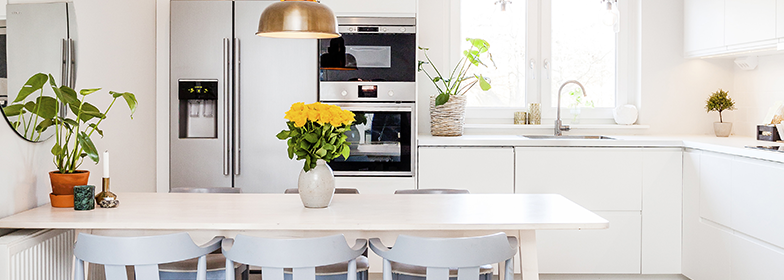
Rent-to-own homes: The pros and cons
Signing a rent-to-own home contract includes either an option or a requirement to buy, usually within three years. Typically, you’ll pay above fair market rent so that an extra portion of your monthly payment can be set aside as a down payment on the home’s future purchase.
If you’re a renter looking for the long-term security that owning a home can offer but aren’t ready to buy yet, rent-to-own homes have several benefits. This homeownership option allows you to save for a down payment while giving you time to build a credit history and improve your credit score.
However, there are risks involved. You’ll forfeit your rent credit and other non-refundable fees if you decide not to buy the home. Also, if the seller doesn’t pay their taxes or mortgage, the house could foreclose while you’re leasing it.
To learn more about how renting to own a home works, along with the pros and cons, continue reading. We’ve put together the basics you’ll need to know before deciding if this is the right choice for you.
How does rent-to-own work?
These five steps can help in understanding better how the process may work once you’ve found a rent-to-own home:
- Negotiate with the seller on a purchase price, option fees and the percentage of your rent payment that will go towards home equity.
- Reach out to a loan officer to discuss mortgage loan options for the home at the agreed-upon purchase price.
- Sign a rental agreement with either an option (known as a lease-option) or legal obligation (known as a lease-purchase) to buy the home after a specific lease term.
- Pay an option fee and make monthly rental payments, including additional payments towards a down payment.
- Before your lease expires, contact your loan officer to get a mortgage to purchase the home.
The pros and cons of rent-to-own
| Pros | Cons |
|---|---|
| Move in right away instead of waiting to save for a down payment. | If you choose not to buy the home, the money you’ve paid is non-refundable. |
| The fee added to your monthly rent means you’ll be building home equity. | Your monthly payments will be higher than the average rent prices in the same area. |
| According to Experian, making all of your monthly lease payments on time can improve your credit score if you ask your landlord to report your rental payment data to the credit reporting agencies. | If you miss payments, it can adversely affect your credit score. |
| If you qualify for a home loan, you’ll be first in line to buy the home. | You might have to move if you don’t buy the home when the lease expires. |
| Your maintenance and upkeep costs may be reduced when renting to own versus buying a home if your landlord splits the repair costs with you. | Splitting repair costs can mean you’ll pay more to maintain the home than renting. |
Rent-to-own home contract FAQs
What are the two types of rent-to-own home contracts?
Two types of rent-to-own home contracts include lease-option-to-buy and lease-purchase agreements. In both agreements, a portion of your rent is set aside for a down payment to purchase the home. The difference between the two is that at the end of a lease-purchase contract, you’re obligated to buy the home when the lease expires, as opposed to a lease-option that allows you to buy the home.
Are there upfront fees?
Yes, they’re called option fees or option money. Trulia defines this charge as a “one-time, non-refundable fee that gives you the option to buy the home at an agreed-upon price in the future.” The fee may be negotiable and range from 1% to 5% of the purchase price.
How long is the typical rent-to-own term?
Usually, terms are inside of three years. However, the term may be negotiable.
Do I need an appraisal and a home inspection?
Before you sign a rent-to-own home contract, Investopedia recommends ordering an appraisal and home inspection. A home inspection can increase your confidence about a home’s condition. It can also reveal costly issues and give you the opportunity to ask the seller to fix problems.
How do I find rent-to-own homes in your area
Are you currently renting and want to buy the home you’re living in? Your landlord may be interested in selling with a rent-to-own agreement. Or, to find a home in a specific neighborhood, search an online real estate portal specializing in rent-to-own home listings.
Alternatively, experienced real estate agents can help to identify rent-to-own properties for sale in your area through MLS searches and their networks. Lastly, try reaching out to a seller whose home has been on the market for months. They may be motivated to sign a rent-to-own home contract.
Find more tips to prepare yourself for homeownership with the Guild Mortgage homebuyers loan guide.
The above information is for educational purposes only. All information, loan programs and interest rates are subject to change without notice. All loans subject to underwriter approval. Terms and conditions apply. Always consult an accountant or tax advisor for full eligibility requirements on tax deduction.
